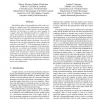Free Online Productivity Tools
i2Speak
i2Symbol
i2OCR
iTex2Img
iWeb2Print
iWeb2Shot
i2Type
iPdf2Split
iPdf2Merge
i2Bopomofo
i2Arabic
i2Style
i2Image
i2PDF
iLatex2Rtf
Sci2ools
94
Voted
ATAL
2004
Springer
2004
Springer
Multi-Agent Simulation of Collaborative Strategies in a Supply Chain
The bullwhip effect is the amplification of the order variability in a supply chain. This phenomenon causes important financial cost due to higher inventory levels and agility reduction. In this paper, we study, for each company in a supply chain, the individual incentive to collaborate to reduce this problem. To achieve this, we simulate a supply chain inspired by the Qu´ebec forest industry, in which each company is an agent that uses one of three ordering schemes. Each ordering scheme represents a level of collaboration. One run of the simulation is done with fifty (50) weeks for each of the ¿ ¾ combinations of these 3 ordering schemes among the 6 companies of the simulation. In each run, we evaluate each company’s inventory holding and backorder costs. These outcomes are used to build a game in the normal form, which is next analyzed using Game Theory. In particular, we find two Nash equilibria incurring the minimum cost of the supply chain. We also note that there are no...
Related Content
| Added | 30 Jun 2010 |
| Updated | 30 Jun 2010 |
| Type | Conference |
| Year | 2004 |
| Where | ATAL |
| Authors | Thierry Moyaux, Brahim Chaib-draa, Sophie D'Amours |
Comments (0)

